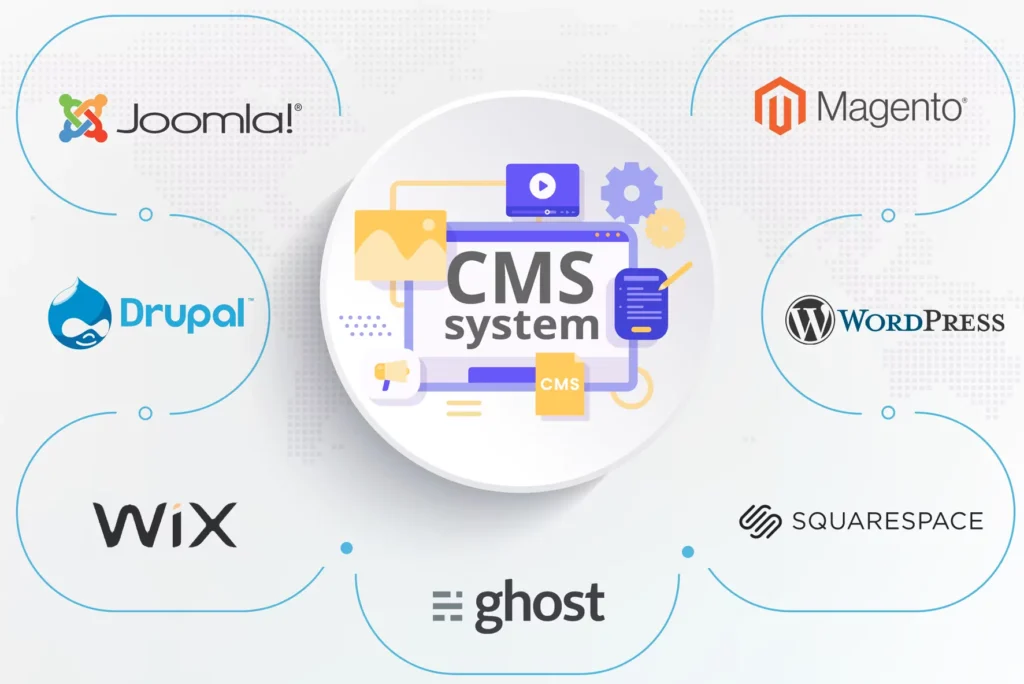What is a CMS?
Content Management Systems (CMS) are powerful tools that allow businesses to create, manage, and modify digital content without requiring technical expertise in coding or development. A CMS provides a user-friendly interface, enabling individuals to focus on content creation rather than technical details.
Whether you’re running a blog, an e-commerce store, or a corporate website, a CMS streamlines the process of managing your digital presence. This is particularly useful for businesses looking to optimize their websites for search engines, such as through SEO services.
Key Features of a CMS
CMS platforms vary, but they typically include features like:
- Content Editing Tools: Intuitive text editors for creating and formatting content.
- Templates and Themes: Pre-designed layouts to give your website a professional look.
- Plugins and Extensions: Add-ons that enhance functionality, such as SEO optimization tools or e-commerce capabilities.
- User Management: Roles and permissions for managing contributors.
- Analytics Integration: Tools to track website performance and user engagement.
A well-chosen CMS can make your website more efficient, attractive, and easier to manage. By leveraging these features, businesses can stay ahead in their digital marketing efforts.
Popular CMS Platforms
- WordPress WordPress is the most popular CMS, known for its flexibility and a vast library of plugins. It caters to all types of websites, from blogs to large-scale e-commerce platforms. Its SEO-friendly structure makes it a top choice for businesses aiming to improve their online visibility.
- Shopify Ideal for e-commerce, Shopify provides tools specifically designed for online stores. Its built-in payment gateway and inventory management features make it a favorite among retailers.
- Wix A user-friendly CMS for small businesses and personal websites. Wix offers a drag-and-drop interface, making website creation simple and intuitive, even for beginners.
- Drupal Known for its robust security features and scalability, Drupal is often used for government and enterprise-level websites. It’s a great choice for businesses that require custom solutions and advanced capabilities.
- Joomla Joomla strikes a balance between ease of use and advanced features. It’s particularly suitable for membership or community-based sites.
Each platform has its unique strengths, making it crucial to choose one that aligns with your business needs.
Benefits of Using a CMS
- Ease of Use: No need for coding skills to update your website. A CMS’s intuitive interface empowers non-technical users to take control of their website’s content.
- Cost-Effective: Save on development costs with ready-to-use templates. With a CMS, you can make changes and updates without hiring a developer for every adjustment.
- SEO Optimization: Many CMS platforms include built-in SEO features, such as meta tags, sitemaps, and URL structuring, helping your site rank higher in search engine results.
- Scalability: Easily grow your website as your business expands. Whether you need to add more pages, integrate e-commerce, or enhance functionality, a CMS adapts to your growth.
- Community Support: Access to extensive documentation and forums for troubleshooting. Many CMS platforms have vibrant user communities that offer tutorials, advice, and support.
For businesses aiming to leverage these benefits effectively, our web development services can provide tailored solutions.
How to Choose the Right CMS for Your Business
- Identify Your Goals: Define the purpose of your website. For instance, an e-commerce site will benefit from Shopify, while a blog may thrive on WordPress. Understanding your goals will help you select the most suitable CMS.
- Consider Customization Needs: Evaluate how much control you need over design and functionality. Platforms like Drupal offer extensive customization, while Wix provides simplicity and ease of use.
- Analyze Costs: Determine your budget for licensing, hosting, and plugins. Some CMS platforms are free to use, while others have subscription-based pricing models.
- Scalability: Choose a platform that can grow with your business. If you anticipate significant growth, ensure your CMS can handle increased traffic and additional features.
For expert guidance, explore our web development services to ensure your CMS aligns with your business strategy.
CMS and Digital Marketing
A CMS is indispensable for digital marketing strategies. Here’s how it enhances your marketing efforts:
- SEO Tools: Optimize your website to rank higher on search engines. CMS platforms often come with built-in tools or plugins for keyword optimization, alt text, and mobile responsiveness.
- Content Scheduling: Plan and automate content updates to engage your audience consistently. This helps maintain a steady flow of information to your visitors.
- Social Media Integration: Share content across platforms directly from your CMS. Integration tools simplify the process of keeping your social media channels updated.
- Analytics: Track visitor behavior to refine your strategy. By analyzing metrics such as page views, bounce rates, and conversions, you can make data-driven decisions.
If you’re new to CMS or need help integrating it into your digital marketing strategy, contact our digital marketing experts.
Common Challenges with CMS and Solutions
- Learning Curve: While CMS platforms are user-friendly, there may be a learning curve for beginners.
- Solution: Leverage tutorials or invest in training sessions for your team. Many platforms offer comprehensive guides and video tutorials to get started.
- Customization Limitations: Some platforms may not offer all the features you need.
- Solution: Work with a web development team to implement custom solutions. Custom plugins or extensions can bridge the gap in functionality.
- Security Concerns: CMS platforms can be vulnerable to cyberattacks.
- Solution: Regularly update your CMS and use reliable security plugins. Additionally, consider hosting your website on secure servers.
- Performance Issues: As your website grows, performance may degrade.
- Solution: Optimize images, use caching plugins, and choose a reliable hosting provider to ensure smooth operation.
Future Trends in CMS
- AI Integration: Advanced tools for content personalization and automation. AI-powered CMS platforms can suggest content, predict user preferences, and enhance user experiences.
- Headless CMS: Decoupling the backend from the frontend for greater flexibility. This trend allows businesses to deliver content seamlessly across multiple devices and platforms.
- Enhanced Mobile Optimization: Improved mobile-first design capabilities. As mobile usage continues to rise, CMS platforms are focusing on providing better tools for mobile optimization.
- Voice Search Optimization: Features that cater to the growing popularity of voice search. CMS platforms are beginning to integrate tools for optimizing content for voice queries.
- Augmented Reality (AR) Integration: Enabling businesses to offer immersive experiences through their websites. AR integration is particularly useful for e-commerce and real estate.
A CMS is more than just a tool for managing content; it’s a cornerstone of modern digital marketing strategies. By streamlining content creation, optimizing your website for SEO, and integrating seamlessly with other digital tools, a well-chosen CMS can drive business growth and enhance customer engagement.
Choosing the right CMS requires careful consideration of your business needs, goals, and resources. Whether you’re starting from scratch or looking to revamp your existing website, a CMS can provide the foundation for a successful online presence.
For more information or assistance, don’t hesitate to contact us. Our team is here to help you make the most of your digital presence.
To visit our social media please click on Facebook and Instagram





